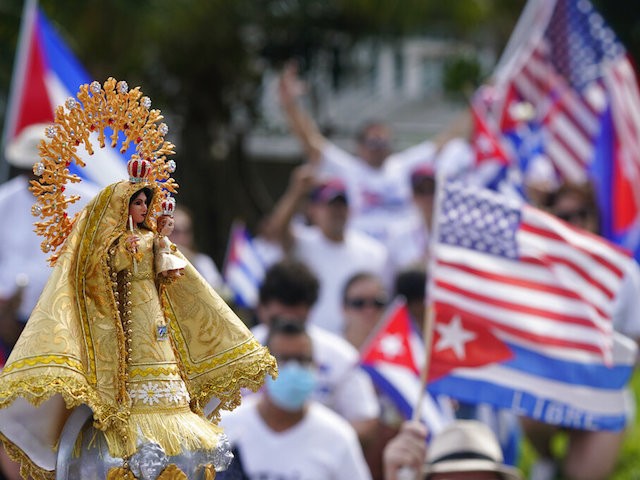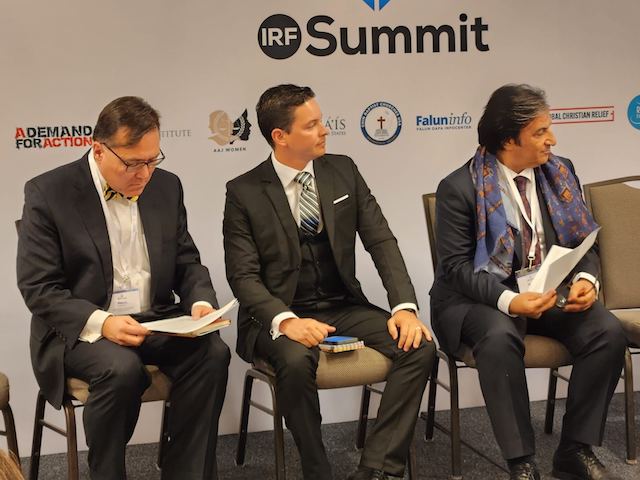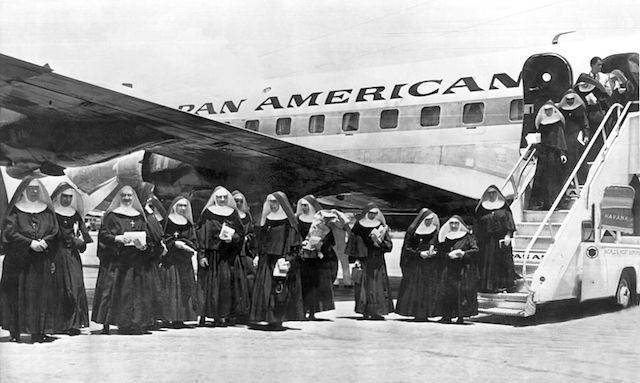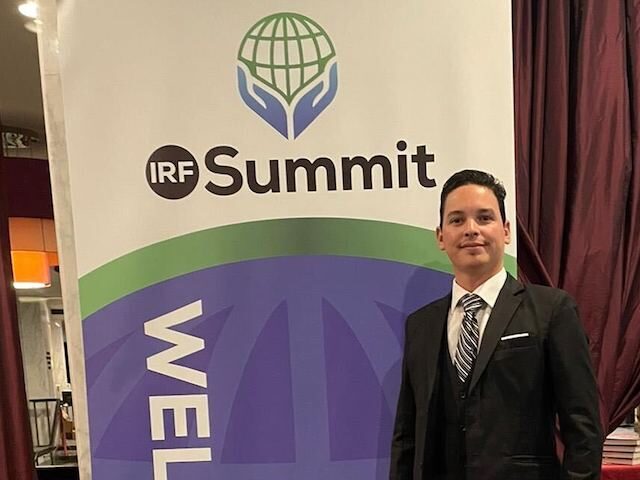The ongoing, nearly incessant anti-communist protest movement in Cuba has been largely fueled by a Christian reawakening on the island, recently exiled Cuban journalist Yoe Suárez told Breitbart News.
Breitbart News spoke to Suárez, an award-winning journalist who fled the island in August after facing what he has described in the past as near-incessant government threats and harassment, on the occasion of his participation in the International Religious Freedom (IRF) Summit in Washington, DC, last week. The Summit is an annual gathering of religious persecution survivors and advocates in defense of the freedom to worship meant to highlight, and ultimately find ways of addressing, hostility against people of faith around the world.
While Latin America is predominantly Catholic and home to growing numbers of Protestant and other Christian denominations, Christian persecution in the region has increased significantly in the past decade. The rise of communist and socialist repressive regimes – such as Cuba’s allies Venezuela and Nicaragua – has prompted a movement to silence political dissent supported on many occasions by clergymen and members of Christian churches. In countries such as Mexico and Colombia, church communities organize to attempt to protect villages and small towns from left-wing narco-guerrillas, who then turn their violent apparatus on the faithful.
Most experts on religious persecution name Cuba as Latin America’s most dangerous place to be a Christian, however, on account of state repression.

A small statue of Our Lady of Charity, the patron saint of Cuba, is held up as demonstrators gather to support protests in Cuba, Sunday, Nov. 14, 2021, in downtown Miami. (AP Photo/Wilfredo Lee)
Suárez, himself a member of the Evangelical League of Cuba since childhood, described to Breitbart News in a phone conversation a delicate situation for Christians on the island, as their faith inherently makes them question the Communist Party’s personality cult led by nonagenarians and the worship of the long-dead Fidel Castro.
“In the special case of Cuba, it must be understood that the Castro regime, as with all socialist tyrannies, all Marxist tyrannies, understands religion as an obstacle to putting the state in the place of God and the revolutionary leader of the moment in the place of the Messiah,” Suárez explained in a phone conversation with Breitbart News. “This idea, which is essentially a humanist idea of putting man in the role of God and taking faith out of there, atomizes society, which makes it much easier for these totalitarian regimes to control the citizen.”
The regime attempts to pressure Christians out of politics entirely when it cannot convince them to support communism.
“The indoctrination the regime imposes [says] ‘Christians don’t get into politics’ – that’s something the socialist regime says and I notice that socialists here say it,” Suárez recalled.
The journalist explained that, as a child – he began attending when he was nine – his church served as a protective cocoon that shielded him from full communist indoctrination, and even he did not fully understand that his faith had any relationship to his political beliefs until college.
“Arriving at university, I have a problem because I wrote that the fight in Playa Girón [the Bay of Pigs operation] was not to defend socialism,” he recalled. “My case was submitted to two commissions … at the university of Havana … thank God I was [not expelled] but that marked me throughout my entire career, and I begin to awaken at a political level and to say ‘the tolerance that socialism preaches does not exist here.'”
That awakening led to his understanding, he later notes, that “there is nothing less true than that Christians cannot get into politics.” That teaching would relegate Christians, he continued, to be “second-class citizens.”

Cuban journalist Yoe Suárez attends a panel at the 2023 International Religious Freedom Summit in Washington, DC. (Courtesy Yoe Suárez)
Suárez said he is far from the only Christian, or only Evangelical, in Cuba to come to the realization that resisting communism is compatible with his faith.
“These people, precisely because of their faith, have taken the step of understanding that the socialist system is pernicious to society,” he explained, “have taken a step beyond faith – it is a step in the physical theater, let’s say: they have taken the streets, they have raised their voice. And, of course, this is repressed by the state.”
“Among the religious leaders, of different religions, Evangelicals were the most repressed during and after July 11. That is to say, there was an important participation of Evangelical leaders in the protests. It is very difficult to know if there were more,” he contined, listing cases of several Evangelicals issued outrageous prison sentences for merely being present during that day’s protests. Among the most prominent cases is that of Pastor Lorenzo Rosales Fajardo of the Mount Zion Church in Santiago de Cuba.
Cuba's communist Castro dictatorship thumbs its nose at the UN as it keeps Pastor Lorenzo Rosales Fajardo in a gulag where guards urinate on him.
Castro dictatorship ignores UN requests for information on Cuban pastor imprisoned since July 2021 – https://t.co/vd0FzLNqAt pic.twitter.com/srH1lBD5Qm
— Alberto de la Cruz (@albertodelacruz) February 19, 2022
“He went out with his community to accompany – as a pastor should do – to accompany his community to demand freedom. He shouted ‘freedom.’ He and his son were both detained,” Suárez noted. Rosales received a seven-year prison sentence for walking with protesters.
Among others who remain in prison since July 11, 2021, for publicly opposing communism are Andy García Lorenzo, sentenced to four years in prison; and sisters Angelica Garrido and Maria Cristina Garrido, sentenced to three and seven years in prison, respectively. Maria Cristina Garrido received a far larger prison sentence likely because she livestreamed the protest in the sisters’ native Quivicán on Facebook, sharing it with the world and adding to the impression that day that the communist regime had lost its stranglehold on the country.
La escritora #cubana María Cristina Garrido y su hermana Angélica Garrido están condenadas a 7 y 3 años de prisión respectivamente por manifestarse pacíficamente en #Cuba.
Ellas solo pedían Libertad y Derechos!
Ellas son #INOCENTES!!#PresosPorQué? pic.twitter.com/xbr1i5BtZP— Félix Llerena 🇺 (@FelixLlerenaCUB) September 17, 2022
Religious people of all stripes featured prominently in the officially atheist country’s protest that day. Among the most dramatic images of the July 11 revolt were the attacks on Catholic priests who had taken the streets. One clergyman, Father Castor José Álvarez Devesa, was the subject of a particularly brutal public beating, bludgeoned in the head and dragged through the street in eastern Camagüey before detaining him for a day.
El Padre Castor, valiente servidor de Cristo. Arriba Cuba!
Posted by Janisset Rebeca Rivero on Monday, July 12, 2021
Also arrested on July 11, 2021, and still in prison is Loreto Hernández García, a senior leader of the Association of Free Yorubas of Cuba. The Yorubas subscribe to the uniquely Cuban Lucumí or santería faith, predominantly based in Nigerian paganism but syncretized with some elements of Catholicism. Hernández was sentenced to seven years in prison for his presence at the protests.
The mass arrests have done little to deter Cuban dissidents. Among the most vocal resisting the regime, of course, are the loved ones of the political prisoners. On one notable occasion shortly after the July 11 protests, for example, the family of Andy García Lorenzo took to their front door –the regime had placed them under house arrest – and loudly sang songs of freedom for the public to hear.
Assembly of the Cuban ResistanceWhile American mainstream media cameras have largely moved away from Cuba, the protests have not quelled. The Cuban Observatory of Conflict, an independent organization, documented nearly 4,000 anti-communist protests on the island in 2022.
Suárez told Breitbart News the Christian community, and Evangelicals in particular, have played a key role in keeping the opposition vocal. Evangelical groups, he noted as one example, organized petitions against the revamped “Family Code,” a communist proposal last year to codify same-sex marriage, among other progressive ideas, in an attempt to sway the favor of the international left after the July 11 protests made opposition to the Castro regime a celebrity cause throughout Latin America. Evangelical groups also organized a petition against constitutional reforms proposed at the same time.
“Evangelicals have collected the two largest numbers of physical signatures in Cuba – a country in dictatorship where there is no freedom of assembly, no freedom of association – and they have done it very courageously with pastors detained, cited, threatened for doing it,” Suárez explained, “against the new constitution and one against the family code, two policies of the Cuban regime that introduce gender ideology in the legal body of the country, definitive neo-Marxism.”
“Evangelicals made history first with 190,000 signatures against the constitution and over 140,000 signatures against the regime’s family code. This is history, but you’re never going to hear about this anywhere,” Suárez said, expressing frustration with international corporate media for lack of coverage. Most English-language mainstream reporting in America celebrated the family code as a triumph, making only passing mentions of “unusual activism” on the part of Evangelical Cubans.
“Someone may say, ‘I dont see this in the media’ – well, of course, the conservative Evangelicals are people who are not in agreement with all the neo-Marxism that is part of the mainsteam politics and media,” he noted, “and of course their statements, their actions are invisibilized, or at best ignored, by mainstream media.”
Cuba has historically been the most dangerous place in Latin America to be a Christian in the aftermath of the 1959 communist revolution. Late dictator Fidel Castro targeted Christians – in particular, Jehovah’s Witnesses and Seventh-Day Adventists – for imprisonment in the Military Units to Aid Production (UMAPs), concentration camps designed to eliminate “counter-revolutionaries.” The Party recognized Christians as dangerous to the communist cause as long-haired men, suspected homosexuals, artists, and other “undesirables.” Catholics, the majority, also faced severe repression, ousted from running their schools and silenced if found to be preaching against communist ideology or the left-wing theological craze at the time, Liberation Theology.

Thirty-eight Roman Catholic nuns of the Order of the Apostolate of the Sacred Heart arrive on a special Pan American refugee flight from Cuba, Miami, Florida, May 18, 1961. (Photo by Underwood Archives/Getty Images)
On the other side, the counterrevolutionary movement of the early Revolution remained close to Christianity. The Bay of Pigs operation, doomed thanks to the betrayal of radical leftist John F. Kennedy, counted multiple priests among the ranks of the anti-communist fighters. The 2506 Brigade, the group that attempted to liberate Cuba, prominently features a cross on its emblem to this day.
The Christian aid group Open Doors ranked Cuba number 27 on its 2023 editor of the World Watch List, which lists the nations that persecute Christians the most. In Latin America, only Colombia ranked higher due to narco-guerrilla warfare, not supported by the democratically elected government.
Cuba rose a dramatic ten spots on the World Watch List following the July 11 protests “thanks to an increase in violence and pressure in all spheres of life,” the organization explained this year.
“Cuba’s communist regime is not tolerant of dissenting voices or any other institutions gaining influence or power,” the group noted. “The church falls into both of these camps and, as a result, Christians experience persecution from the authorities.”

COMMENTS
Please let us know if you're having issues with commenting.